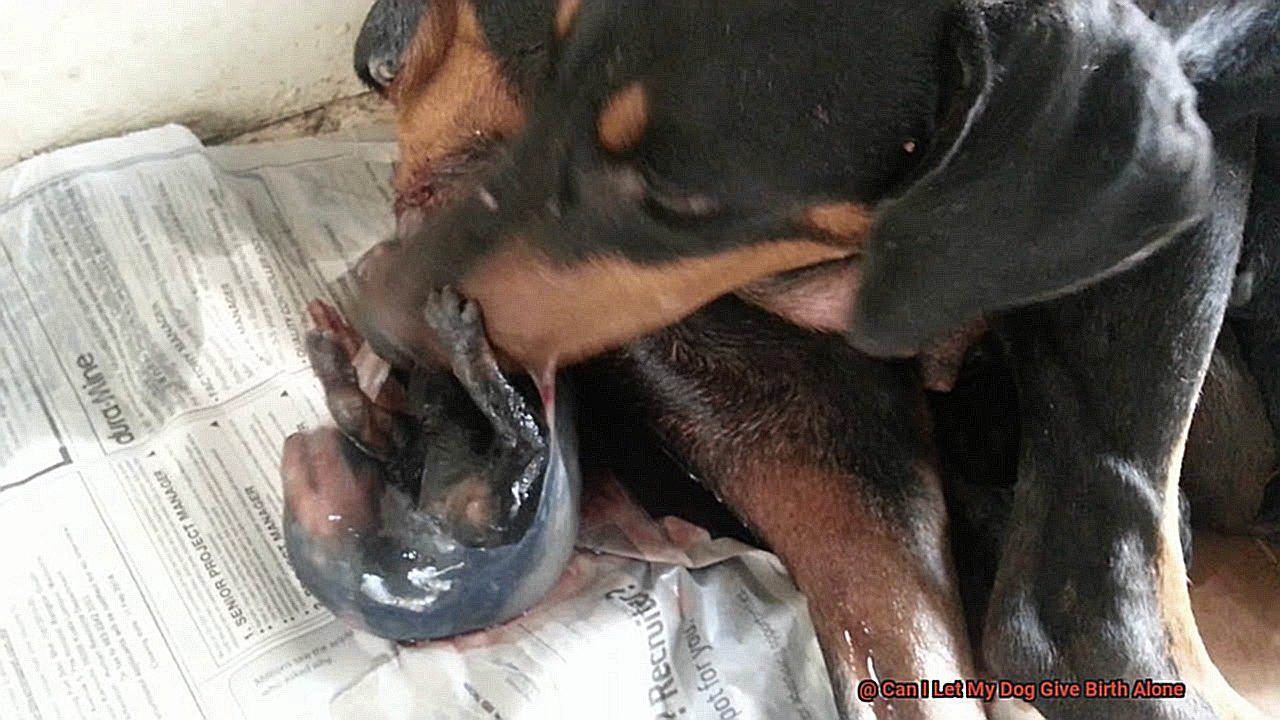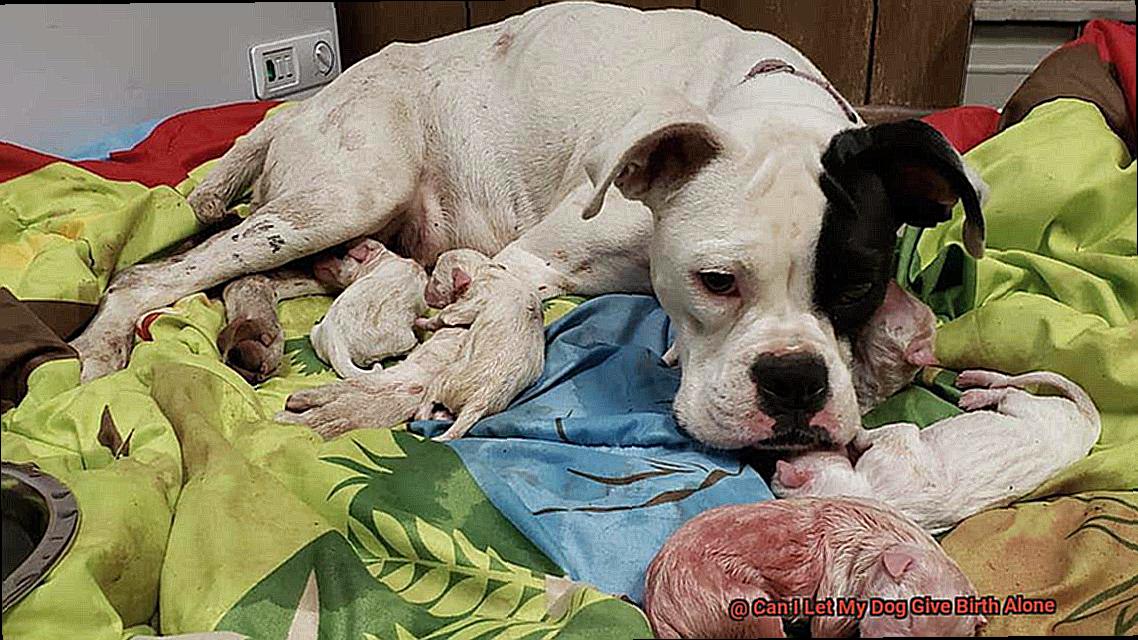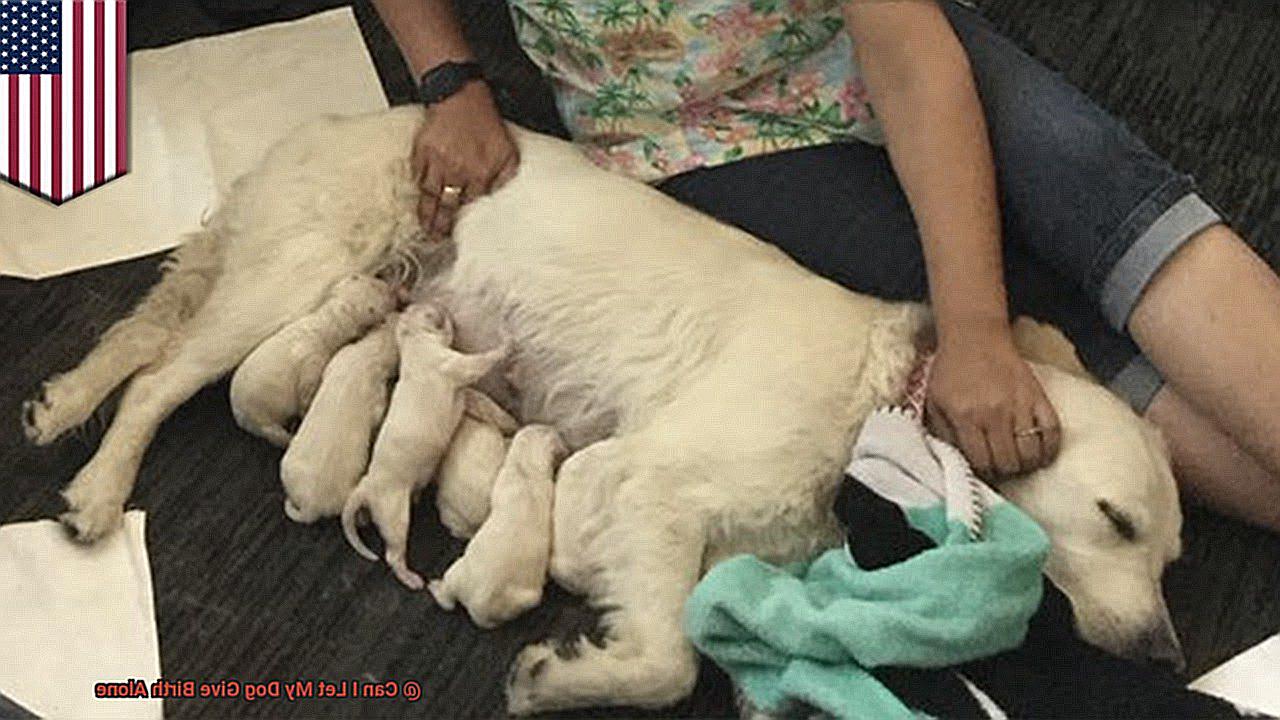Can I Let My Dog Give Birth Alone?
Picture this: the anticipation builds as your furry friend prepares to bring new life into the world. It’s a moment of wonder and excitement, but also one that raises an important question – should you lend a helping hand or trust your dog to handle the birthing process alone? This topic ignites passionate debates among dog enthusiasts, each armed with valid arguments.
In this blog post, we’ll dive into the pros and cons of letting a dog give birth without human intervention. We’ll explore everything from the safety and health considerations for both mom and pups to understanding their emotional needs during this transformative experience.
Before we delve deeper, it’s essential to remember that every dog and birth situation is unique. Regular consultations with your trusted veterinarian are crucial throughout the pregnancy journey to ensure optimal well-being for both mother and puppies. With that in mind, let’s explore whether it’s best to let nature take its course or step in when needed.
Can I let my dog give birth alone
Contents
- 1 Can I let my dog give birth alone
- 2 The Risks of Allowing a Dog to Give Birth Unassisted
- 3 French Bulldogs and the Need for Professional Assistance During Labor
- 4 What an Expert Can Provide During the Birthing Process
- 5 The Benefits of Having an Expert Present During Delivery
- 6 Unexpected Complications That May Arise During Labor
- 7 Preparing for Potential Emergencies During Delivery
- 8 Emotional Support for Dogs During Childbirth
- 9 Conclusion
While some dogs may be capable of delivering their puppies without complications, it is generally recommended to have a knowledgeable person present during the birthing process.
Why is it important to have assistance during the birthing process? Well, just like humans, dogs can experience complications during labor and delivery that may require immediate veterinary intervention. Having someone experienced with canine births present can help ensure the safety of both the mother and her puppies.
French Bulldogs, in particular, have a higher risk of complications during labor due to their narrow pelvis and large-headed puppies. Therefore, it is especially crucial to have someone experienced with French Bulldog births present to provide support and assist if needed.
So, what should you consider when deciding whether or not to let your dog give birth alone? Here are some factors to keep in mind:
- Potential complications: Dogs can experience difficulties during labor, such as prolonged labor, malpositioned puppies, or the inability to deliver a puppy. These situations can be life-threatening for both the mother and her puppies if not addressed promptly. Having an expert present during the birth can greatly increase the chances of a successful delivery and reduce the risk of complications.
- Expert knowledge: A professional breeder or a veterinarian will have the necessary knowledge and skills to assist the dog during labor. They can monitor the progress of labor, check for signs of distress in the mother or puppies, and provide immediate medical attention if necessary.
- Emergency situations: Even if everything seems to be going smoothly, unexpected emergencies can arise during labor, such as uterine inertia (when contractions stop), fetal distress, or retained placenta. An expert can quickly identify and address these issues, ensuring the safety and well-being of the mother and her puppies.
- Emotional support: Dogs may become anxious or stressed during labor, and having a familiar and calming presence can help ease their discomfort and promote a smoother birthing experience.
While some dogs may be able to give birth alone without complications, it is always safer to have an expert present. Their knowledge and experience can provide necessary support, monitor for any potential complications, and ensure the safety of both the mother and her puppies.
In conclusion, it is generally recommended to have a knowledgeable person, such as a professional breeder or veterinarian, present during the birthing process. They can provide assistance, monitor for complications, and provide immediate medical attention if necessary. Consulting with a veterinarian or experienced breeder before allowing your dog to give birth alone is highly recommended to ensure the best possible outcome for both the mother and her puppies.
The Risks of Allowing a Dog to Give Birth Unassisted
Today, we’ll be discussing the risks of allowing your furry friend to give birth without any assistance. While it may seem like a walk in the park, there are several potential dangers that can arise during this crucial time for Mama Frenchie and her adorable puppies. So, let’s dive right in and explore the risks together.
Complications during Labor and Delivery:
Dystocia: This fancy term refers to difficult or prolonged labor, which can be caused by factors such as oversized puppies or a narrow pelvis. If left unaddressed, dystocia can lead to distress for both the mother and her puppies, potentially resulting in injuries or worse.
Inadequate Care for Newborn Puppies:
- Neglect and Hypothermia: Without proper monitoring, unassisted births may lead to neglect or insufficient attention given to newborn puppies. This can result in hypothermia, where their little bodies get too cold. Sacrebleu. We don’t want that.
- Hypoglycemia: Another risk is low blood sugar levels in the newborns. Just like humans, these little bundles of joy need their sugar fix. Failure to provide proper care can lead to hypoglycemia, which can be life-threatening for the puppies.
Postpartum Complications for Mama Frenchie:
Retained Placenta and Uterine Infections: After giving birth, Mama Frenchie may experience issues such as retained placenta or uterine infections. These conditions can cause discomfort and health problems if not addressed promptly by a veterinarian. Let’s keep our Mama Frenchie healthy and happy.
Emotional Well-being of Mama Frenchie:
Stress and Overwhelm: Giving birth can be quite overwhelming for dogs, especially if they’re inexperienced or facing difficulties. We all need a little support, don’t we? Having a knowledgeable human presence can provide comfort and reduce potential complications for Mama Frenchie.
Missed Opportunities for Early Detection:
Congenital Abnormalities and Health Issues: Allowing Mama Frenchie to give birth unassisted may result in missed opportunities to detect any potential issues in the puppies early on. A trained professional can often spot signs of birth defects or developmental disorders during the birthing process, allowing for timely intervention and better outcomes for the puppies.
French Bulldogs and the Need for Professional Assistance During Labor
When it comes to the birthing process, French Bulldogs require some extra care and attention. In this guide, we will delve into why professional assistance during labor is crucial for French Bulldogs and how it can ensure a safe delivery for both the mother and her puppies.
Narrow Birth Canals:
French Bulldogs, like many other brachycephalic breeds, often have narrow birth canals. This can make the delivery process challenging, leading to prolonged labor and distress for both the mother and the puppies. Having a professional present during labor ensures that any difficulties can be addressed promptly, minimizing the risks associated with natural delivery.
Risk of Dystocia:
The oversized heads of French Bulldog puppies pose an additional challenge during labor. Dystocia, or difficulty giving birth, can occur if the puppies become stuck in the birth canal. Without professional assistance, this can result in serious complications or even death for both the mother and her puppies.
Uterine Inertia:
French Bulldogs are also prone to complications such as uterine inertia, where the uterus fails to contract effectively. This can lead to prolonged labor or a complete cessation of contractions. Professional assistance is vital in such cases as it ensures timely intervention and appropriate medical interventions if required.
Monitoring Progress and Making Informed Decisions:
Having a veterinarian or experienced breeder present during labor allows for continuous monitoring of the mother’s progress. They can assess the well-being of both the mother and her puppies and make informed decisions regarding potential interventions. In some cases, a C-section may be necessary to ensure a safe delivery.
Safety First:
While some French Bulldogs may be able to give birth without complications, it is always better to prioritize safety. The potential risks involved in letting a French Bulldog give birth alone far outweigh any perceived benefits. Seeking professional assistance ensures that any potential complications are handled promptly, reducing the risks of injury or death during the birthing process.
What an Expert Can Provide During the Birthing Process
So, grab a cup of tea, sit back, and let’s get started.
Assessing the Mama Dog:
Picture this – your fluffy Frenchie mama is getting ready to pop, but how do you know if she’s ready? That’s where an expert comes in. They can assess her physical condition, check those hormone levels, and make sure she’s in tip-top shape for delivery. It’s like having a personal trainer for your doggy mama.
Creating the Perfect Birthing Environment:
Now that we know mama is ready, it’s time to set the stage for her big moment. An expert can guide you on creating a cozy and stress-free environment for your furry friend. From setting the right temperature and humidity to choosing the perfect nesting materials, they’ve got all the inside knowledge to ensure a comfortable and safe space for labor and delivery.
Monitoring Mama’s Progress:
Once labor kicks into high gear, an expert will be by your side, keeping a close eye on mama’s progress. They’ll be watching her behavior, timing those contractions like a pro, and making sure everything is going smoothly. Think of them as your personal labor coach – always cheering mama on and ready to step in if things take a turn.
Assisting with Difficult Deliveries:
Sometimes nature needs a little helping hand, especially when it comes to those tricky deliveries. An expert can spot any signs of distress or complications and jump into action. Whether it’s repositioning a puppy or performing emergency procedures, they’ve got the skills to ensure a safe delivery for both mama and her precious pups.
Caring for the Newborns:
Once those adorable little French Bulldog puppies make their grand entrance, an expert will be there to guide mama in cleaning them up and making sure they’re breathing properly. They’ll also provide tips on postpartum nutrition and care for mama and her adorable bundles of joy.
The Benefits of Having an Expert Present During Delivery
Preparing for the arrival of a litter of French Bulldog puppies is an exciting and joyous time. As a responsible owner, you want to ensure that your Frenchie mama has the best possible care during this critical period. That’s why having an expert present during delivery can make all the difference. Let’s take a closer look at the benefits they bring:
Expert Monitoring and Guidance
An expert can closely monitor the progress of labor and delivery, identifying any complications or difficulties that may arise. They have the knowledge and experience to recognize signs of distress in the mother or puppies and can take immediate action to address any issues.
Minimizing Complications
Having an expert present can help minimize the risk of complications during delivery, such as difficult or prolonged labor. They can also identify uterine inertia, where contractions are not strong enough, and take appropriate measures to ensure a safe birth.
Emergency Interventions
In case of emergencies, such as a breech birth or the need for a caesarean section, an expert can perform necessary interventions. Their quick thinking and skills can save lives and prevent potential harm to both mother and puppies.
Assisting with Delivery Techniques
An expert can provide guidance on proper positioning and techniques for assisting with the delivery process. This ensures that the puppies are born safely and without harm.
Pre- and Post-Natal Care Advice
An expert can offer advice on how to properly care for the mother before, during, and after delivery. They can provide guidance on nutrition, exercise, and post-natal care to ensure both mama and puppies stay healthy.
Addressing Potential Complications
An expert can educate you about potential complications that may occur after delivery, such as mastitis or retained placentas. They will provide you with valuable information on how to address these issues promptly.
Reassurance and Peace of Mind
Having an expert present during the delivery process provides reassurance and peace of mind to you as an owner. You can rest easy knowing that you have someone knowledgeable by your side, ready to handle any situation that may arise.
Unexpected Complications That May Arise During Labor
When it comes to the miracle of birth, it’s essential to be prepared for any unexpected complications that may arise during labor. As an expert in canine reproductive health, I’m here to share my knowledge and insights with you.
So, let’s dive into the potential complications that can occur during your Frenchie’s labor and what signs to look out for.
Dystocia (Difficult Labor):
Imagine your Frenchie’s birthing process hitting a roadblock. Dystocia occurs when there are difficulties with delivery due to oversized puppies or the mother’s struggle to push them out. Signs may include prolonged labor, excessive straining without progress, or a puppy stuck in the birth canal. If you notice any of these signs, don’t delay – seek immediate veterinary assistance to prevent life-threatening situations for both mom and pups.
Uterine Rupture:
A uterine rupture is like a storm brewing in the calm sea of labor. It happens when the uterus tears or ruptures, leading to severe bleeding and endangering the mother’s life. Excessive force during labor or previous trauma/surgery on the uterus can cause this complication. Keep an eye out for sudden weakness, pale gums, rapid breathing, abdominal pain, or hemorrhage – if you spot any of these symptoms, rush your Frenchie to the vet without delay.
Retained Placenta:
Just like a sailor who doesn’t drop anchor after docking, a retained placenta can cause trouble after birth. Normally, a Frenchie expels each placenta after delivering a puppy. However, if one remains inside the uterus, it can lead to infection or uterine inflammation. Look out for signs like restlessness, loss of appetite, fever, foul-smelling discharge, or abdominal pain. In such cases, consulting a veterinarian is crucial to ensure the well-being of the mother.
Prolapsed Uterus or Rectum:
Imagine a ship experiencing a structural malfunction during its voyage – that’s what a prolapsed uterus or rectum is like. A prolapsed uterus occurs when the uterus protrudes from the birth canal, while a prolapsed rectum refers to the protrusion of rectal tissue. Both conditions require immediate veterinary attention to prevent tissue damage and infection. Watch for visible protrusion from the birth canal, excessive straining, or signs of pain – never try to push the tissue back in yourself.
Preparing for Potential Emergencies During Delivery
Expecting a litter of French Bulldog puppies can be an exciting and joyous time. However, it is essential to be prepared for potential emergencies that may arise during the delivery process. In this article, we will discuss the importance of being prepared and provide you with valuable tips to ensure the safety and well-being of both the mother dog and her puppies.
Recognizing Potential Emergencies:
During delivery, several emergencies may occur, requiring immediate attention. It is crucial to be aware of these situations and take appropriate action promptly. Here are some potential emergencies to watch out for:

Stuck Puppies:
Sometimes, a puppy may get stuck in the birth canal, making it difficult or impossible for the mother to deliver naturally. Recognizing this situation is crucial, as it can lead to complications if not addressed promptly. If you notice a stuck puppy, contact your veterinarian immediately for assistance.
Uterine Inertia:
Uterine inertia refers to the cessation or weakening of contractions during labor. This condition can prolong labor and put both the mother and puppies at risk. Keep a close eye on the dog’s contractions and seek veterinary help if they stop or if there is no progress after a reasonable amount of time.
Placenta Retention:
In some cases, a puppy may be born with the placenta still intact, which can interfere with its ability to breathe properly. It is essential to remove the placenta promptly and ensure that the puppy can breathe without any difficulties.
Hemorrhaging:
Hemorrhaging can occur if the mother dog tears or ruptures a blood vessel during labor. Excessive bleeding can be life-threatening, so it is crucial to identify any signs of hemorrhaging and seek immediate veterinary assistance.
Preparation is Key:
To handle potential emergencies effectively, it is vital to be prepared. Here are some essential steps you can take:

Emergency Contacts:
Have your veterinarian’s phone number readily available, and know the location of an emergency veterinary clinic that can provide immediate assistance if needed.
Birthing Kit:
Create a well-stocked birthing kit that includes items such as clean towels, sterile gloves, lubricant for aiding delivery, scissors for cutting umbilical cords, and antiseptic solution for cleaning wounds if necessary.
First Aid Techniques:
Familiarize yourself with basic first aid techniques specific to dog births. Knowing how to stimulate breathing in newborn puppies or administer CPR if needed can potentially save lives.
Create a Calm Environment:
During the delivery process, it is crucial to remain calm and composed. Dogs can sense your emotions, and stress or anxiety can negatively impact their ability to give birth smoothly. Creating a calm and supportive environment for your dog can help reduce the risk of complications during delivery.
Emotional Support for Dogs During Childbirth
Welcoming a litter of adorable French Bulldog puppies into the world is an exciting and joyful experience. However, it’s important to remember that the birthing process can be both physically and emotionally demanding for your furry friend.
Providing emotional support to your dog during childbirth is not only essential for her well-being but also contributes to a more positive birthing experience for everyone involved.
Be Present: Your Presence Matters
Being present during the birthing process can make a world of difference for your dog. Your familiar presence will help reassure her and create a sense of security. Stay close by, offering gentle encouragement and soothing words. Your calm energy will help keep stress levels at bay.
Physical Comfort: The Power of Touch
During labor, offering physical comfort can help alleviate your dog’s anxiety. Gently petting and massaging her can provide a sense of relaxation and promote bonding between you and your dog. This physical touch helps release oxytocin, the hormone responsible for reducing stress and promoting positive emotions.
Creating a Serene Environment:
Dogs are sensitive to their surroundings, so it’s vital to create a calm and quiet environment for the birthing process. Consider playing soft, soothing music to create a peaceful atmosphere. Keep other pets and children away from the birthing area to prevent distractions or disturbances that may increase your dog’s stress levels.
Vigilance in Observation:
While providing emotional support, it’s crucial to closely observe your dog during labor and delivery. Look out for any signs of distress or complications, such as excessive panting, restlessness, or difficulties during birth. If you notice anything concerning, reach out to your veterinarian promptly for assistance.
Post-Birth Comfort:
Once the puppies have arrived, continue providing emotional support by ensuring your dog has a quiet and comfortable space to rest with her new family. Limit visitors and handle the puppies with care to avoid causing unnecessary stress to the mother.
Remember, Every Dog is Unique:
Each dog has different emotional needs and responses during childbirth. Pay close attention to your French Bulldog’s behavior and adjust your approach accordingly. Trust your instincts as a pet parent and strive to provide the best possible emotional support for your furry friend.
PtGofcFupcE” >
Conclusion
It is not advisable to let your dog give birth alone. While some dogs may be able to handle the process without assistance, there are potential risks and complications that could arise. It is important to provide support and supervision during the birthing process to ensure the health and safety of both the mother and her puppies. Leaving a dog alone during labor can lead to difficulties in delivering the puppies, such as prolonged labor or dystocia.
In addition, there may be medical emergencies that require immediate attention, such as a stuck puppy or a retained placenta. Being present during the birth allows you to monitor for any signs of distress or complications and seek veterinary assistance if necessary.
By being present, you can also provide comfort and reassurance to your dog, who may feel anxious or stressed during labor. Your presence can help create a calm environment and reduce any potential distress she may experience.
Furthermore, being involved in the birthing process allows you to assist with tasks such as cleaning up newborn puppies, cutting umbilical cords, and ensuring proper nursing. This hands-on approach helps promote bonding between you and the puppies while also ensuring their well-being.
While it is natural for dogs to give birth on their own in the wild, domesticated dogs have come to rely on human intervention due to selective breeding practices that have altered their ability to give birth without complications.
In conclusion, it is best not to leave your dog alone during labor and delivery.




